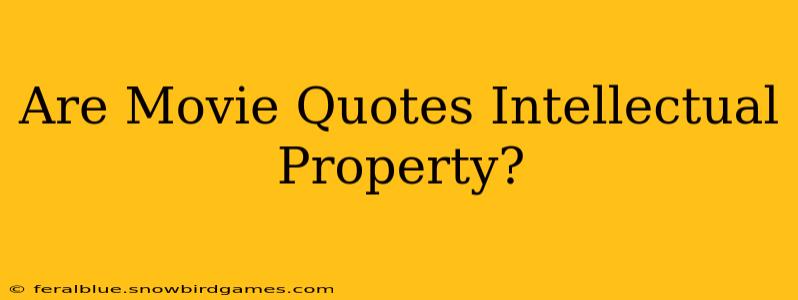Are Movie Quotes Intellectual Property? Unraveling the Complexities of Copyright and Fair Use
The question of whether movie quotes are intellectual property is surprisingly nuanced. While they might seem like simple phrases, their legal status hinges on several factors, including copyright law, fair use, and the specific context in which the quote is used. Let's delve into the intricacies.
Understanding Copyright and its Application to Movie Quotes
Copyright law protects original works of authorship, including literary, dramatic, musical, and certain other intellectual works. A movie script, as a written work, is undeniably protected by copyright. This protection extends to the dialogue within the script, meaning the movie quotes themselves are generally considered part of the copyrighted material. However, this doesn't grant an absolute, blanket protection.
The Role of Fair Use
The doctrine of "fair use" is a crucial exception to copyright law. It allows limited use of copyrighted material without permission for purposes such as criticism, commentary, news reporting, teaching, scholarship, or research. This is where things get tricky for movie quotes.
Factors Determining Fair Use of Movie Quotes:
-
Purpose and character of the use: Is the quote used for transformative purposes (e.g., creating a parody, analyzing the film's themes)? Transformative uses are more likely to be considered fair use. Simply repeating a quote for its own sake is less likely to qualify.
-
Nature of the copyrighted work: While a movie script is a creative work, the use of a single quote might be considered less significant than using a large portion of the script.
-
Amount and substantiality of the portion used: Using a short quote is less likely to infringe on copyright than using a long passage of dialogue.
-
Effect of the use upon the potential market: Does using the quote harm the market for the movie or its related products? For example, using a quote in a competing film might be problematic, while using it in a critical review would likely not be.
H2: What constitutes infringement of movie quotes?
Infringement occurs when someone uses a copyrighted movie quote without permission and it doesn't fall under fair use. This could involve using the quote in a commercial product (like a t-shirt or advertisement) without authorization, using it extensively in a work that directly competes with the original film, or using it in a way that damages the market value of the original film.
H2: Can I use movie quotes in my book or article?
Using movie quotes in an academic paper, book, or article might fall under fair use, especially if the quote is used briefly to support an argument or illustrate a point. However, obtaining permission from the copyright holder is always the safest course of action, even for short quotations.
H2: Are there any exceptions to the copyright on movie quotes?
While fair use provides a significant exception, there are other potential exceptions that might apply in specific circumstances. For instance, short quotes might be considered de minimis (too insignificant to merit copyright protection). This is highly context-dependent, however.
H2: How can I get permission to use a movie quote commercially?
If you intend to use a movie quote commercially (e.g., in an advertisement or a product), you must contact the copyright holder, typically the film studio, to obtain permission. They will likely have specific guidelines and licensing agreements.
Conclusion:
The use of movie quotes falls into a complex legal grey area. While the quotes themselves are technically covered by copyright as part of the original script, the doctrine of fair use provides leeway for certain uses. The best practice is to carefully consider the context of use and, when in doubt, seek permission from the copyright holder to avoid potential infringement. Understanding the nuances of copyright and fair use is critical for anyone wishing to incorporate movie quotes in their work.

